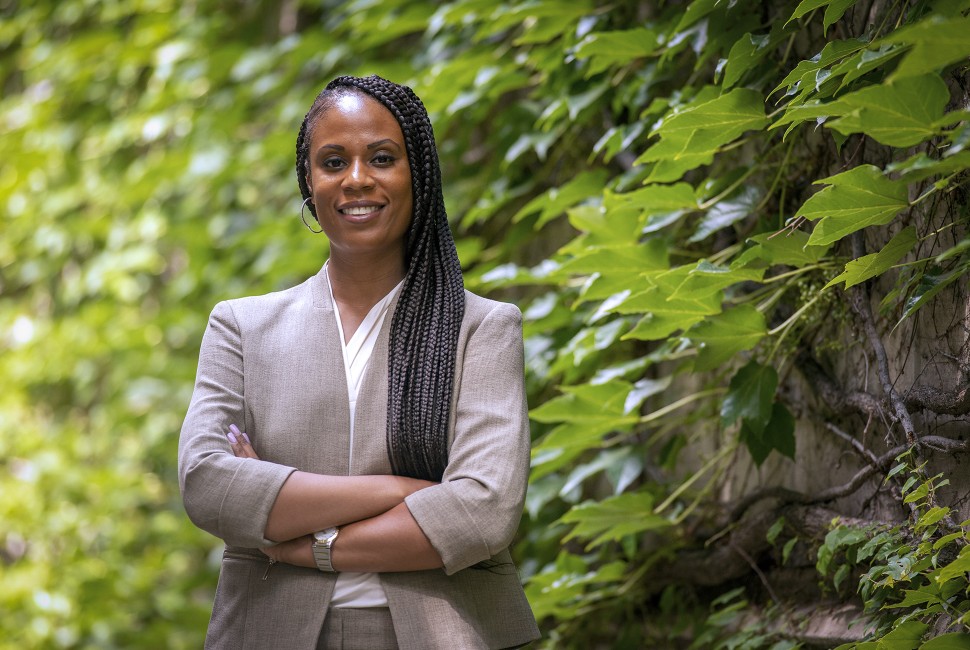In 2019, someone called the police on Elijah McClain — a 23-year-old Black man from Aurora, Colorado — because they thought he looked “sketchy” wearing a ski mask in August. McClain had anemia, which caused him to feel cold even in warm weather.
Though he was doing nothing wrong, the police subdued him with a dose of ketamine that proved fatal. The story is an encapsulation, according to Jamelia Morgan, of what happens far too often when people of color with disabilities encounter law enforcement.
“Race and disability should not become pathways to police violence,” she said. “That’s at the core of our agenda: preventing a confluence of racism and ableism from impacting the day-to-day lives of people, especially people of color with disabilities.”
Morgan, a professor at Northwestern’s Pritzker School of Law, recently launched the Center for Racial and Disability Justice (CRDJ), which will promote justice for people of color, people with disabilities and people at the intersection of those identities.
In an interview with Northwestern Now, Morgan describes her motivation for founding the center, explains the relationship between race and disability and lays out her vision for the center’s work going forward: “I’m excited about the possibility of powerful and effective collaboration with Chicago’s rich ecosystem of activists and organizations to enact change,” she says.
Why did you decide to pursue a career in law?
I grew up in Los Angeles in the early 1990s; I was seven when Rodney King was beaten by LAPD officers, spurring the LA uprisings. My interest in being a lawyer stems from some of the social movements of that period and their focus on policing and Black communities. It’s sobering, of course, to note that we’re still dealing with many of the same issues.
As a Black woman, I also had family members who were impacted by the criminal legal system. To me, lawyers seemed to be the only people with a handle on that system who were able to secure justice in some cases. So, after growing up amid injustice, I had a desire to use the law as a means of responding to community harm.
What led you to found the CRDJ?
Before law school, I read Michelle Alexander’s book, “The New Jim Crow.” That book gave voice to things that I’d experienced regarding people caught up in the criminal justice system; its impact within Black communities; and the racial caste system in America. So, from my first days practicing law, I was thinking about the barriers and injustices that my clients were facing.
In law school, I participated in legal clinics that gave me the chance to defend clients for the first time. We interviewed and filed lawsuits on behalf of a number of individuals with disabilities who were incarcerated in Connecticut under conditions that failed to meet their medical and mental health needs, in violation of the Americans with Disabilities Act.
That work sparked my interest in disability law and inspired me to take a class on the topic, which opened a whole new perspective on anti-discrimination law. That became the framework which continues to inform my work today.
Why do you see disability justice, criminal justice and racial justice as intertwined?
The intersection stems from a combination of public policy that has failed low-income people with disabilities and the criminalization of mental illness. For decades, there has been a lack of investment in a robust healthcare system and infrastructure to meet the needs of people with chronic health conditions — like mental health needs — who can’t afford quality healthcare.
When people lack support systems, they often end up in emergency situations where they need crisis care services. This often leads them to encounter police officers instead of trained mental health personnel. Many of the people who have been killed in encounters with law enforcement have had psychiatric diagnoses or disabilities.
Finally, we know that there’s both a lack of investment and an over policing problem in many Black and Latinx communities. So, people of color with disabilities are disproportionately likely to have encounters with law enforcement for multiple reasons. This is incredibly troubling.
When you think about stories like Elijah McClain’s, what broader issues do you see at play?
This story illustrates what happens so often to Black men with disabilities: They’re marginalized in two different ways. It’s imperative that we think about how Black men are rendered vulnerable to policing, and why their identity is constructed as threatening, confrontational or noncompliant. Disability can result in non-normative expressions and behaviors which are in turn constructed as a basis for criminalization. In McClain’s case, there were clear violations of the Fourth Amendment, but we need to think broadly about the pathways that led to his killing.
Why do you feel it’s appropriate and important to have the center here in Chicago?
Chicago has a very rich history of organizing for Black movements. It’s been the home of many leading racial justice organizations that have been thinking critically about the intersection of law and social change for decades, including important work to combat police violence. The disability rights movement has also always had a home here, with some leading organizations headquartered in the city.
Efforts are underway here to redirect law enforcement away from mental health crisis situations and instead have trained mental health personnel respond to reduce the risk of violence. Much work remains to be done in this and other areas, such as expanding the ability of people with disabilities to live independently. Many institutionalized disabled people who could live independently in the community are still fighting for the ability to do so via lawsuits. I’m excited about what we can accomplish on these issues by working with community partners.
Where are you hoping to take the center over the next few years?
For now, we’ve kept our vision broad: We’re interested in tackling all issues at the intersection of racial and disability justice in a way that promotes human thriving for all people of color. We’re currently developing our strategic priorities, a process that I hope will incorporate community voices. But in our first year, we’re going to focus on three specific areas.
The first is crisis care. Because of the criminalization of disability, and psychiatric disabilities in particular, we need better ways of responding when people experience mental health crises. We’ll be weighing in with policy briefs and legal scholarship in that area.
The second area is healthcare discrimination. We’re working with a team of terrific doctors at the Feinberg School of Medicine on research dealing with ableism and disability-based discrimination in healthcare settings. Implicit bias can affect the provision of services, so we’ll be working on ways to develop more inclusive clinics. For example, we can educate and raise awareness among instructors through things like licensing or educational requirements.
The third and final area of focus is access to the courts. We’ll conduct research and develop technical manuals to support the creation of accessible courtrooms where not only criminal defendants, but civil litigants are able to access and understand court documents. The physical space of the court also needs to be accessible to all persons with disabilities. We’re looking for a jurisdiction that will allow us to use one courthouse as the demonstration site for an inclusive and accessible courtroom experience.


